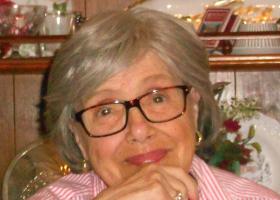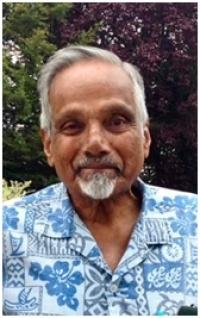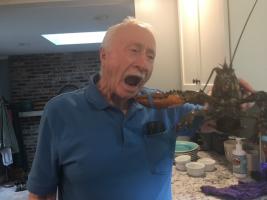 MORTON GERALD HARMATZ of AMHERST, MASS, March 25, 1939 – August 25, 2017
MORTON GERALD HARMATZ of AMHERST, MASS, March 25, 1939 – August 25, 2017
Morton Gerald Harmatz, psychologist, musician, and retired UMass professor, died in his long-time Amherst home in the company of his loving wife, Robin, late in the evening of August 22, after 78 years of full and passionate living. His death was the result of complications from ALS, also known as Lou Gehrig’s disease. He was the son of the late Harry Jacob Harmatz and Louise (Hershenfeld) Harmatz. He is survived by his beloved wife, Robin (Lynes) Harmatz, his cherished son, Mark David Harmatz of Belchertown, and his older sister, Rose Steinberg, of New York.
Mort was born on March 25, 1939 on the Lower East Side of New York City. Though the Harmatz family moved to Queens for a time, Mort spent the majority of his youth growing up on the Lower East Side of Manhattan. He went to Hebrew School and became a bar mitzvah in 1952. Though he had a deep love of Judaism as a cultural identity and an ethical way of being in the world, he had little taste for the more religious aspects of Judaism and claimed to remember little of his early training. His family was not strictly observant, and Mort did not frequent the synagogue as an adult, but he encouraged his wife to see what Judaism might have to offer her as part of her own spiritual quest, leading to her conversion in 2012. Despite his claims that he did not remember anything from Hebrew School or service practices, he displayed a surprising amount of knowledge of the Shabbat home blessings when they became important to Robin years later. The Friday evening prayers and a sweet kiss to welcome Shabbat became precious to both of them. It was, quite literally, on so many levels, a gift Mort gave to Robin resulting in a spiritual blessings that Robin had brought back into his life
As a youth and teenager, Mort frequented the Henry Street Settlement house, where, as a talented budding musician, he came to occupy the first trumpet chair in the Pitt Street Orchestra as well as mastering classical piano. He was part of a quartet that played weddings and bar mitzvah’s as well as at hotels in the Catskills in the summer. As a musician and a member of the Beat generation, Mort liked to hang around the coffee shops in Greenwich Village, where all the cool cats were reading Freud when they weren’t delving into Kierkegaard.
Mort graduated from Forrest Hills High School in Queens–to which he continued to commute even after the family moved back to Manhattan–in 1956. He left for college at 17, first attending SUNY Fredonia, a campus devoted to the performing arts, as a music major. At Fredonia, he took stock of the American orchestral scene and noted that the few trumpet chairs were already occupied by relatively young musicians, leaving little hope for him of gainful employment. He also recognized that some of his classmates had a different caliber of musical gift, which he felt he would never match no matter how many hours he devoted to practice. So, he left behind his dreams of a musical career, falling in love, instead, with the discipline of psychology.
Even as a teenager, Mort had an instinct for divining what people were thinking below the surface–a sense of what drove them, what hurt them, how they thought. He wouldn’t have said he was a mind-reader, but he had a keen intuition about humans and how they acted. Psychology gave him a way to engage with the world, and to draw upon his instincts and intuitions to help others. To follow this new interest, Mort transferred from Fredonia to Ohio State University, where he met his first wife, of 20 years, Marilynne, a talented dancer and a gifted artist. After his graduation, they moved to Seattle, where Mort completed his masters and his PhD at the University of Washington–receiving his doctorate at the age of 24, writing his dissertation on a typewriter while living on a houseboat in the Puget Sound. He completed a post-doc fellowship at the University of Oregon Medical School to refine his clinical training. He often told a story of administering a Rorschach test in the ER to a man having a psychotic break, who reached over in the midst of the examination to touch his arm–to see if he were real. This story represents the exquisite blending in Mort’s practice of clinical training and intuition–that Mort had the capacity at such a moment to put down the testing instrument and help a suffering man feel like he was still a part of the world.
Mort and Marilyn came to Amherst in 1964 where Mark was born five years later. Even after their divorce, they remained committed parents to their son. Mort loved Mark with every fiber of his being, always wanting what was best for him, encouraging him in his education and his interests, and wanting him to be happy. One of the bright spots in this late time of his illness was getting to spend more and more time with his son. He relished just having Mark in the room with him, or going out to lunch with him at Panera, or sitting around and watching golf or whatever else was on TV, and especially listening to Mark talk about his experience in the world–he loved that.
Mort was granted tenure at UMass in 1970 and was one of the founding faculty members of the clinical psychology doctoral program at the University of Massachusetts Amherst. For more than four decades, Mort was greatly respected by his colleagues in the Psychology Department, as he was known to be a man of kindness, fairness, and good humor regardless of the challenges at hand. During his many years as the Director of Clinical Training, Mort helped lead the doctoral program to a level at which it gained national recognition as a model of clinical psychology training. When Mort decided to retire, his colleagues implored him to remain on as director for a few more years as the program transitioned to a clinical science model of training; as was typical of Mort’s generosity and selflessness, he agreed to do so. As a clinical supervisor in the department’s Psychological Services Center, Mort was eagerly sought out by doctoral trainees who were fortunate to be supervised by an individual with such a remarkable level of clinical knowledge, skill, and intuition. On the undergraduate level, Mort’s courses in abnormal psychology and human sexuality attracted a capacity crowd of five hundred students each semester. In addition to authoring textbooks in both of these areas, Mort published dozens of research and scholarly articles in the field of psychology. As a testament to his excellence as an educator, Mort was awarded the College Outstanding Teaching Award in 1999. Mort gave generously of his time and talent in the Psychology Department through his service on countless committees, in the community as a consultant to mental health agencies, and on the national level through his active involvement in several professional associations. Especially notable was his five-year appointment by Governor Weld to the Massachusetts Board of Registration of Psychologists, with responsibility for the credentialing and oversight of more than 6,000 psychologists in the Commonwealth. In the final years of his term on the Board, Mort was elected to serve as Chair, a role he fulfilled with distinction and was instrumental in rewriting the regulations around psychological training and ethical standards.
Early in his career, he had also been a Vista Volunteer–serving in this domestic version of the Peace Corps to fulfill a mission of strengthening community mental health resources and clinical training in remote areas of the country. He talked about his consultations in the “Appalachian hollers”, where he honored the work, but was troubled by the contrast between his comfortable life and the incredibly impoverished communities he was serving.
Mort consulted for community mental health programs during the period of de-institutionalization, including work at the Northampton State Hospital and Belchertown State School that helped advocate for a more holistic system of treatment, based in the necessity for patients of basic human contact. He also had a private practice, using an eclectic approach to support a wide variety of needs over many years, seeing clients up until March of this year. Mort was a curious and highly intelligent practitioner, an eclectic psychotherapist, and a compassionate soul, motivated, fundamentally, by kindness and a fascination with the remarkable mystery of the human experience.
Mort and his second wife, Robin, met in 1982, when she consulted with him over an issue she was encountering in her work at a local family planning clinic. Both were hesitant to engage in a long term relationships based on recent experience, but they nonetheless fell headlong in love with each other, and were together for the next 35 years. They got married in the backyard of the home they built together. All of the wedding pictures show them laughing. The home itself became a place of sanctuary for them–their center–and in the last few months it was a saving grace for Mort to be able to survey his small portion of the world from the top of the hill, through the many windows of the living room, trusting that Robin would be there, and feeling at ease. “He gave me the most amazing life,” Robin says; “passion, music, theater, joy, laughter, connection through really hard things, a fidelity that was bone-deep, soul-deep. He brought out the best in me,” she said. “He brought out the best in a lot of people. He loved me even when I didn’t deserve it.”
But her devotion to Jewish life actually created a pathway for him to find some solace in it as well, especially at monthly musical Friday evening services, which he attended regularly finding the capacity, Robin said, “to weep as if his heart were breaking.”
Mort was a funny man, with a sense of humor described as “clever and wonderful.” “A day that began with big laughs at his quips,” a friend wrote,” was a good day.” With certain friends, he could engage in humor as if it were a bloodsport, though he knew when he had crossed over to the “ouch.” Robin, who he sometimes called his “little Mensa”, said she felt brilliant when she came up with something he thought was good, and another friend noted that when she saw them walking down the street, with one of their many dogs, “it seemed like you had grown up in the same NY neighborhood because your sense of humor, your sparkling wit, matched so well.” Mort loved his social group that met regularly at Rao’s and was a devoted friend. He loved physical activity, especially bicycle riding, which he found ways to pursue to the fullest even as his illness began to claim him. He was a great photographer, and a people watcher, and he delighted in theater and art, reading, and film, and profound discussions about all of these things. He had an appreciation of road trips and fine automobiles, and a map of the world in his mind drawn up to demarcate, in particular, the places where he had experienced a particularly delicious meal or other sensory delight.
It is a piece of the inexorable tragedy of being that such a rich life as this met such a stifling end. It was terrible to watch Mort lose the capacities of mobility and communication, to see him stumble and to choke as he tried to drink a glass of water. But even in the midst of this decline, he experienced the blessing of an enviable tenderness both given and received. It is a testament to the quality of his spirit, and to the tenacity and truth of a long and loving marriage.


